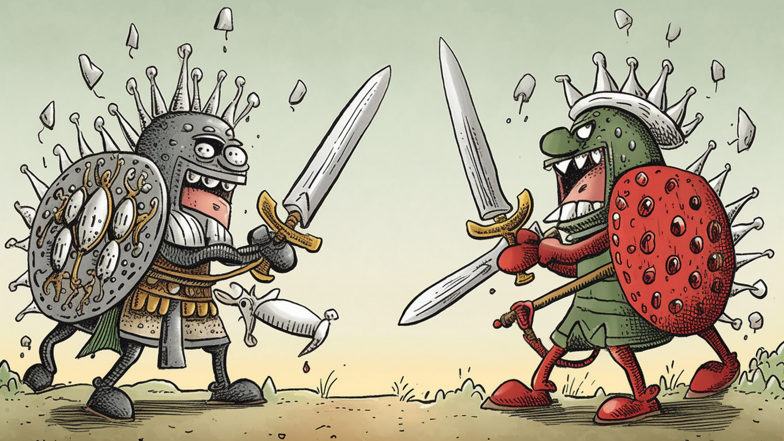
Components of the Immune System
The immune system consists of several components that work together to keep us healthy. These components include the white blood cells, antibodies, and lymphatic system. Let's take a closer look at each of these components:
White Blood Cells:
White blood cells, also known as leukocytes, are the backbone of the immune system. They are produced in the bone marrow, and their primary function is to detect and destroy pathogens that enter the body. There are several types of White blood cells, each with a specific role to play in the immune system:
- Neutrophils: the most common type of white blood cell that helps fight off bacterial infections.
- Lymphocytes: also called T cells and B cells, they play an essential role in the adaptive immune response by remembering and recognizing specific pathogens.
- Monocytes: they have the ability to differentiate into macrophages, which help to engulf and digest invading pathogens.
Antibodies:
Antibodies are proteins that are produced by B cells to neutralize pathogens such as viruses and bacteria. They are one of the essential components of the adaptive immune system. Antibodies are highly specific to the pathogen that caused their production, allowing them to recognize and bind to the pathogen, preventing it from causing further damage.
Lymphatic System:
The lymphatic system is a vast network of vessels, nodes, and organs that circulate lymph around the body. Lymph is a clear fluid that contains white blood cells and other proteins crucial to combating infections. The lymphatic system plays a crucial role in maintaining the fluid balance of the body and helps to remove waste products from the tissues.
Functions of the Immune System
The primary function of the immune system is to defend the body against pathogens, including bacteria, viruses, and parasites. The immune system is responsible for identifying, neutralizing, and eliminating these invaders. Here's how the immune system functions:
1. Identification:
The immune system must first recognize the invading pathogen. It does this by identifying specific molecules on the pathogen's surface called antigens. Antigens are foreign substances that trigger an immune response.
2. Triggering an immune response:
Once the immune system detects an antigen, it triggers a response that involves the activation of specialized cells and molecules. These immune cells can recognize and respond to a particular antigen with specificity.
3. The immune response:
Once an immune response is triggered, it targets the pathogen in a variety of ways. Here's how it works:
- Antibodies bind to the antigens, neutralizing them and making them harmless.
- White blood cells are deployed to the site of the infection to attack and kill the pathogen directly.
- Inflammation occurs, which is a natural response of the immune system that helps to destroy the pathogen and limit its spread.
4. Memory:
The immune system has a memory that allows it to remember past infections. This is what provides immunity to previously encountered pathogens. Memory cells are created to recognize and quickly respond to antigens. This is why you don't catch the same disease twice.
Immune System Disorders
The immune system is essential for our health, but it can sometimes be disrupted by various disorders. When the immune system mistakenly attacks the body's own cells and tissues, it's known as an autoimmune disorder. Autoimmune disorders can affect any part of the body and can result in serious health problems such as lupus, rheumatoid arthritis, type 1 Diabetes, and multiple sclerosis.
On the other hand, immunodeficiency disorders occur when the immune system is weakened, making the body susceptible to infections and diseases. Immunodeficiency can be acquired or inherited. Examples of an acquired immunodeficiency disorder include HIV/AIDS, which attacks and damages the immune system. Inherited diseases such as severe combined immunodeficiency (SCID) can also cause immunodeficiency.
Boosting Your Immune System
The immune system is a highly complex system, and it's essential that we take good care of it. Here are some strategies to boost your immune system:
1. Eating a Healthy Diet:
A healthy diet is critical for optimal immune system function. Foods rich in vitamins and minerals, such as fruits, vegetables, whole grains, and lean protein, can help the immune system remain strong and healthy.
2. Exercise:
Regular exercise helps to boost the immune system by promoting the production of white blood cells and decreasing stress.
3. Stress Management:
Stress can weaken the immune system, making you more susceptible to infections and diseases. Simple stress-management techniques such as meditation, deep breathing, and yoga can help to reduce stress levels.
4. Sleep:
Sleep is essential for maintaining optimal immune function. Getting a good night's sleep is crucial for both the adaptive and innate immune response.
Conclusion:
The immune system is undoubtedly one of the most efficient and complicated systems in our body. It works tirelessly to keep us healthy and protect us from invaders that cause illness. Understanding how it works and the importance of keeping it healthy is crucial to achieving optimal health and wellness. By taking care of our immune system through proper nutrition, exercise, stress management, and getting enough sleep, we can help to boost its effectiveness and keep our body's natural defense system functioning at its best.
Comments
Post a Comment